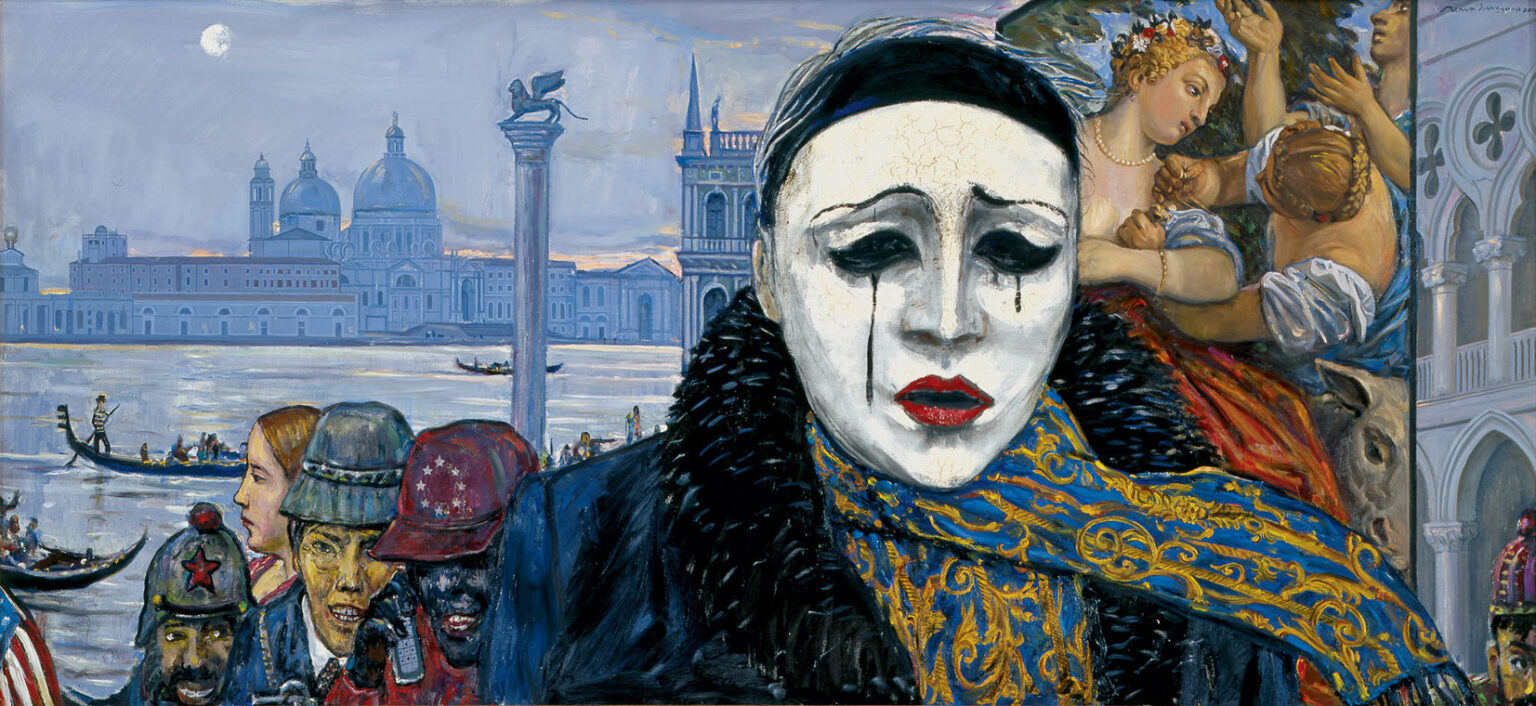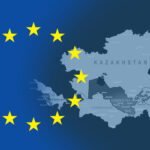Is the formula E=mc² sexist? Perhaps. We can express our hypothesis this way: this formula gives preference to the speed of light over other speeds that are extremely important to us. I believe the proof of the formula’s possible sexism lies in its preference for the fastest moving element.
or
The reason why solid-state physics is more advanced than fluid mechanics is that ‘solidity’ is associated with men and ‘softness’ with women.
These and many other inane ideas belong to Luce Irigaray, a typical representative of many pseudo-intellectuals, who criticize science without knowing anything about it, never mind reckoning with its achievements, a renowned French philosopher, feminist, linguist, psycholinguist, psychoanalyst and cultural theorist, author of over 20 books.
There is a postulate in the Azerbaijani mentality that is accepted by the majority, not as a result of discussion and reflection, but rather as a result of propaganda, accepted silently as no alternative is offered, so we can call it “secret”: intellectuals are mostly writers, or: being engaged in literary pursuits automatically makes one an intellectual. The notion of “intellectual” is a controversial one and there is no popular consensus on its definition. In my opinion, an intellectual is a mental activist who rationally analyzes the world for people and presents its interpretation substantiated with material reasons. This definition of an intellectual includes activities that reduce real-world events and motives of people’s actions to the tried and tested laws and patterns of natural sciences and humanities. Such an intellectual is guided in their explanations by the “bottom-up” (referring to factors arising from human activity and nature) approach rather than “top-down” (without reference to worldly or celestial superpowers) and explains phenomena with as few necessary and sufficient factors as possible (the Occam’s razor principle). An intellectual’s interpretation of the world involves drawing attention to the problem, diagnosing it and showing possible solutions, based on tried and tested criteria.
It is not easy for those with deficient factual and experimental support, those dealing with areas where measurement and comparison are impossible, to give a rational interpretation of the world; such interpretations are inevitably aphoristic and sloganic, simplistic and confusing in nature.
The above definition is not about the privileged intellectual class, but rather about all people, in our age when contrary and false information is more accessible, being able to interpret the world for themselves, provided they are accustomed to critical thinking and rely on trustworthy sources. This is consistent with wanting the knowledge of the enlightened thought to be accessible and to be shared and discussed (“Enlightenment is a process of learning about the use of the human mind that has not yet been completed and should be open to all.” – Moses Mendelssohn).
There are a number of “epistemological obstacles” to the democratization and spread of objective knowledge and rational thinking. One of these obstacles is the imitation of knowledge and thinking. I would like to give an example of one of such obstacles, which is very popular in our country: reading is understood as reading of only literary fiction (the second obstacle, in my opinion, is believing scientific thought to be “second-rate” and philosophical judgments and intuitive statements not supported by facts and experiments to be “first-rate”, superior and pure thinking activity).
The absolute majority of active readers are literature readers, constantly moving from one work to another, adding to the list of literary works they have read, and even reading more than some writers promoting literature. However, literature is not real life, and likening any real-life person to a literary character, or comparing a real-life event to a book plot, and articulating commonly known problems thousands of times, albeit in a colorful form, does not make one an intellectual. It is practical and useful to start with literature, but staying within its limits will result in inefficiency of reading.
In my opinion, in order to be an intellectual, it is if not sufficient then at the very least essential to have a serious education in one of the natural sciences or humanities, to know a foreign language well enough to read reliable sources on the subject, to possess critical reading and analytical thinking skills. Low reading standards lead to an in increase in the number of people who pass the “intellectuality” filter, and the lack of a critical approach in the reader causes intellectuals to stay in the comfort zone and not work on themselves, to repeat themselves, and even easily deny what they said yesterday. One must be well-versed in life experience, education, professional knowledge, biology, psychology, behavioral motives, patterns of social groups, religion and mythology, and, of course, to be engaged in labor activity. Without the latter, one will never be able to juxtapose theory with reality.
I’m curious about the reasons behind the bias and anger directed towards us by Western media, political circles, and celebrities during our military actions in 2020, which were conducted in full compliance with international law. How do our intellectuals explain the cause of this prejudice?
For those staying in the comfort zone, it is natural to resort to clichés, to accept history as immutable and deterministic. Such people may cite Christian compassion as the cause of their bias. However, this does not explain Canada’s embargo on Turkey and its arms sales to Saudi Arabia. Is it perhaps “Aryan compassion”? However, in the late 19th and early 20th centuries, when this hypothesis was strong, the “Aryan” nations of Europe shed each other’s blood. There must be more mundane and simpler reasons. Macron, a politician, won’t say, “We are Aryan and so are they. So even if I know they are wrong, I have to support them” but will make politically motivated decisions and, when making those decisions, will refer to the clichés accepted as the truth. Those clichés have been promoted for over a hundred years, and the West has come to see them as the truth. People give money to a show business star who collects donations not because of the Aryan ties, but because they sympathize with world-famous celebrities. When raising funds for stray animals, whose plight is as well known, they probably won’t say, “Stray animals are not Aryan, so we are not donating.” It is important to pay attention to the difference between the two approaches, because with one of them it is natural to give up, to say “we can’t do anything”, and with the second, there are challenges for us to act in concrete areas.
There is a discourse of clichéd thought in Europe, and Westerners have dogmatized that discourse against the backdrop of the comfort brought by material and technological progress, as well as the collapse of Communism. We now have very little time to communicate the truth to the world, while Armenians have been spreading their messages for over a hundred years, repeating them over and over again, and these messages are now considered true because they have been heard many times and become part of the feeling that shapes the attitude towards us in the dogmatic European mind. Although we often hear in interviews on Karabakh that “we have conveyed the truth about Karabakh to the world community”, it seems that the truth has not reached those ears. This has been our comfort zone, and as a result, the Western press, which took an objective approach to the problem in the 1990s, is already biased. The reason is our naïve belief that the West will investigate and learn the real truth and take the right side. This is not how it works in the real world: even if you are right, you have to prove it.
Suppose that a media outlet assigns its employee to write about Armenian-Azerbaijani relations. The journalist writes an article based on the false talking points, which he has heard so many times and which are available to him in the chaos and bustle of daily work. He already has an idea of what his editor wants to read and so he publishes an article speaking in clichés in accordance with his own approach. Those writing the reality face the threat of the strong Armenian lobby in the West, as shown below. What active role do we have here? Almost none whatsoever. That is why we take the easy way out and explain it with Christian or Aryan compassion, with reasons beyond our control, justifying our inaction.
Today, Western criticism emphasizes that the problems of the modern world are caused by enlightenment and modernism movements, and it is claimed that, in accordance with the tradition established by the Romantics, science mechanizes man and the world, numbing man and depriving the world of meaning. In fact, the world and human view that science is shaping in accordance with the purpose of the tradition established by the Romantics was not completed; with the little regard for science, the results of the theory of evolution in terms of human psychology and behavior and thought were not taken into account. As a result, they ended up with an incomplete worldview. In the long discussions Western intellectuals—writers, journalists, political scientists, philosophers, linguists and psychologists—devote to the problems of the world and man, neither the definition of man nor the results of the theory of evolution are taken into account. As a result, they discuss the problems of “spherical chickens in a vacuum,” as the physics joke puts it.
Post-modernists have declared the “end of great discourses”: great theories are the product of science, which is in fact a protest against science—whereas both the Big Bang theory in physics and the theory of evolution in biology are great discourses that are successful and empirically supported.
Relativists decided that all values were superfluous, and they were unashamed of doing so sitting in their comfortable rooms, using the possibilities offered by the scientific and technological progress, receiving payments from the taxes of the economic initiative. If there are no objective criteria for choosing between cultures, how come people try to escape from certain countries and take refuge in certain countries?
The romantic critique of civilization and the emphasis on the idealization of primitive life became so strong that renowned anthropologists idealized Stone Age tribes. It turns out that such major anthropologists as Margaret Mead were wrong in that (as she later admitted).
What did Europe not accept as a system of scientific thinking? The synthesis of socialism, which claims that justice will be established by deterministic psychoanalysis without an empirical basis, without taking into account the human factor, such as behavioral psychology, by changing our conditions with a momentary forceful wave. Human psychoanalysis is a failed synthesis that claims that society will be understood by Marxist theories.
The intellectual discourse that has captured the Western mind today is incapable of solving the West’s own problems, let alone the problems of the world. Let’s look at some examples of how the West approaches problems.
A serial killer (Jack Unterweger) sentenced to life imprisonment for murder in Austria begins to write and publishes a book while in prison. The Austrian political and literary elite (including the famous Günter Grass) launches a campaign, believing that the man will never be the same person he used to be because he was engaged solely in literature, and manage to get the convict pardoned and released. The now ex-convict is hired by a magazine to write about crime, and he covers eight similar murders committed during his tenure there. While police investigate the murders, Jack travels to the United States to cover the work of the Los Angeles police. Two more similar murders are committed in Los Angeles. The final realization that these murders were committed by the same person and that this person was Jack Unterweger, who has not been rehabilitated after all, comes at the cost of the lives of eleven people.
Let’s look at the European refugee policy. Although colonialism is officially gone, Europe’s old colonial ties and policies remain in place. People living in such Western-backed regimes have three options: 1) to be exploited in the mines, 2) to join armed gangs and take up robbery, or 3) to try to flee to Europe by finding a few thousand dollars and giving them to human traffickers and drown in the Mediterranean. It is enough to highlight the problems of immigrants who have managed to make it to the land, you can forget about the rest and convince yourself that their problems have been solved.
I also remember a story about Africa I watched on CNN. The program sought to find out why an African country was cooperating with China, expressing a “fear” that China would exploit Africa. The country’s minister of finance said that China would build railways, hospitals, schools and medical facilities in exchange for mining copper. He tried to explain in a polite way that the West had not given anything in return for what it had taken so far. I think that the minister was wrong, because in order to shield the world’s eyes from the truth, Westerners have created some primate reservations there to protect chimpanzees and gorillas. Unfortunately, in the countries where such regimes remain, primates in reservations are not protected—more than that, primates and elephants are targets of illegal hunting for commercial purposes, and people continue to be exploited as well.
France accepts Muslim immigrants, disregarding the sensitivity of these people on religious issues and offering them no appropriate adaptation program. “Since you came to our home, you have to put up with us mocking your faith, because we have freedom of speech here.” Although this approach has repeatedly been proven problematic, they continue to behave arrogantly, never thinking that it is impossible for conservative people to magically become tolerant in matters of faith overnight. Throw in a lot of “terrorism”, “freedom of speech” discourses, add 2 candles lit at the crime scene, and the picture is complete—everything is in full accordance with the clichés, no need to worry.
The European idea of solution is depicting any problem in art. If a caricature, film, painting, or award-winning photo is devoted to a problem, then the problem is assumed to have been analyzed and solved.
In his biography of Michel Foucault, Didier Eribon describes the admiration of the French media and intellectuals for the leader of the Islamic Revolution, who lived in exile in Paris at the time. Foucault had previously flown to Tehran to meet the revolutionary leader at the airport. Finally, there would be a revolution, the first example of how the destructive thinking of intellectuals could begin to change the world. Although they had sympathized with Stalin before and had been wrong, this time it was bound to be different. The execution of thousands of people after the revolution didn’t let these intellectuals experience the joy of victory, and Eribon writes that Foucault became depressed by this unexpected outcome.
What is the situation in environmental protection? What actions are being taken to stop global warming and the extinction of species? What way out is the West suggesting? First, have a long-running debate over whether there is global warming to begin with. Years later, when it comes to the point of no return, put a child (Gretha Thunberg) on the podium and hide behind her. Ruin the Earth, the planet on which we have had to evolve and adapt for millions of years, the only known habitable planet, and hope that special colonies for elites will be established on exoplanets. “We will clone extinct animals and bring them back to life in the future.”
Hundreds of billions are circulating in entertainment and sports industries in America. From what we have read about science and education, it is clear that in many cases these fields do not get the necessary financing because “there is no budget”, and the material and technical support of American schools is seriously lacking. The actors in the movie about a fictional “Marvel hero” are thousands of times better off than biologists studying and finding cure for genetic diseases. But how does America address the shortcomings in science and engineering? With brain drain. They think that since the conditions in the US are good and bright minds leave their countries in pursuit of better life, they will come to live in the US, and the US will end up with ready-made brains. Brain drain has already become a “Trojan horse” for America. They cannot see that, excluding human and political factors, people, who receive a good education, gain some work experience in America and return to their home countries to start high-tech companies there, have created a brain drain in the opposite direction. There are currently 7 “unicorns” (start-up companies valued at over $1 billion) in the field of artificial intelligence alone in China, and China’s official plan is to overtake the US in the field of artificial intelligence by 2025 and become a world leader by 2030. The founders of these companies are Chinese and Taiwanese who graduated from American universities and gained experience in American high-tech companies.
Another example of brain drain being a “Trojan horse”: since 2005, China has seen rapid development in the field of submarine construction, and the possible reason behind it is believed to be the know-how stolen from the United States. After a lengthy investigation, they discover that a Chinese electrical engineer who immigrated to the United States years ago transferred classified information belonging to the company he worked for (which developed electronic systems for the Department of Defense) to disks at home and sent it to China. But it’s too late, as in many cases when the West wakes up and smells the coffee.
I read a while ago on its official webpage that a new $22 billion collider would be built at CERN (European Nuclear Research Laboratory). Curious, I sent them a question via their webpage. I asked, “Do you really need this collider? Wouldn’t it make more sense to improve the appropriate technology and mathematical apparatus? There is already a great deal of data obtained from experiments, and the theoretical framework for analyzing them does not yet exist. What progress do you expect to get by observing slightly more exotic particles at slightly higher energies?” I thought that this project was born out of the necessity to ensure the allocation of funds to continue the bureaucratic inertia.
The feedback I received from the followers of the page was not rational at all, it was more like the twiddle-twaddle we find on local pages. The answers I received can be summarized as “Do you think you’re smarter than CERN?”
By Europe’s incomplete mind, I mean the emergence of a new form of the old scholasticism that does not take into account human nature as we know it from biology, seeks the root of problems in modernism without considering the incompleteness of modernism, does not see out of its comfort zone that the world is changing, and wants to instill its own confused, complex, pseudo-intellectual ideas in others. Philosophers of the scholastic nature once sat in their offices and assumed that the world should be as they thought it should be—without knowing that the human mind could be mistaken and that experiment was a condition for correction. Now the same approach is applied to humanitarian issues.
I think that today, in the post-war period, a new challenge begins for us. By raising awareness of our just position, we can explain how the West was deceived by the Armenian discourse, elaborate on the cost of this deception for the region and our country, and use it as an example of why they should give up the comfort of their approach to other issues. It seems that Europe’s incomplete mind creates more problems than it solves, and persistent problems cannot be solved with the old logic.












